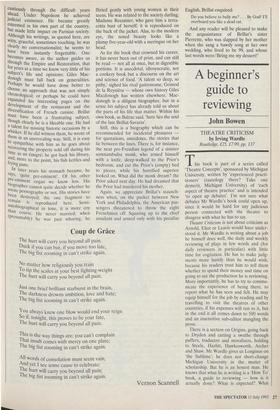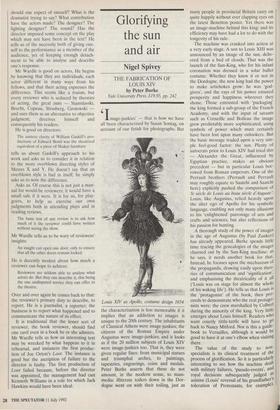A beginner's guide to reviewing
John Bowen
THEATRE CRITICISM by Irving Wardle Routledge, £25, £7.99, pp. 137 This book is part of a series called 'Theatre Concepts', sponsored by Michigan University, written by 'experienced practi- tioners' (tautology there? Take one demerit, Michigan University) of 'each aspect of theatre practice' and is intended 'to open up debates'. I'm not sure what debates Mr Wardle's book could open up, since it would be hard for any judicious person connected with the theatre to disagree with what he has to say.
Theatre Criticism is not about criticism as Arnold, Eliot or Leavis would have under- stood it. Mr Wardle is writing about a job he himself does well, the daily and weekly reviewing of plays in few words and (for daily reviewers in particular) with little time for cogitation. He has to make judg- ments more hastily than he would wish, because his readers trust him to tell them whether to spend their money and time on going to see the production he is reviewing. More importantly, he has to try to commu- nicate the experience of being there, to report what he has seen and felt. He may equip himself for the job by reading and by travelling to visit the theatres of other countries, if his expenses will run to it, but in the end it all comes down to 500 words and an insensitive sub-editor mangling the prose.
There is a section on Origins, going back to Dryden and cutting a swathe through puffers, traducers and moralisers, holding to Steele, Hazlitt, Hawkesworth, Archer and Shaw. Mr Wardle gives us Longinus on 'the Sublime'; he does not short-change Michigan University in the matter of scholarship. But he is an honest man. He knows that what he is writing is a 'How To' book, a guide to reviewing — how is it actually done? What is expected? What should one expect of oneself? What is the dramatist trying to say? What contribution have the actors made? The designer? The lighting designer? The sound? Has the director imposed some concept on the play which may not have been in the text? He tells us of the necessity both of giving one- self to the performance as a member of the audience, yet of keeping enough detach- ment to be able to analyse and describe one's response.
Mr Wardle is good on actors. He begins • by knowing that they are individuals, each actor different in many ways from his fellows, and that their acting expresses the difference. This seems like a truism, but every reviewer who is seduced by theories of acting, the great isms — Stanislavski, Brecht, Copeau, Strasberg, Grotowski — and uses them as an alternative to objective judgment, deceives himself and consequently his readers. He is good on directors:
The austere clarity of William Gaskill's pro- ductions of Edward Bond was the theatrical equivalent of a piece of Shaker furniture
tells us about Gaskill's approach to his work and asks us to consider it in relation to the more overblown directing styles of Messrs X and Y. He doesn't say that an overblown style is bad in itself; he simply asks us to note the difference.
Asks us. Of course this is not just a man- ual for would-be reviewers; it would have a small sale if it were. It is for us, for play- goers, to help us exercise our own judgments both in attending plays and in reading reviews.
The basic test of any review is to ask how much of it the reviewer could have written without seeing the show.
Mr Wardle tells us to be wary of reviewers' insights:
An insight can open one door, only to ensure that all the other doors remain locked.
He is decently modest about how much a reviewer can hope to achieve:
Reviewers are seldom able to analyse what actors do. But they can describe it, this being the one undisputed service they can offer to the theatre.
Over and over again he comes back to that: the reviewer's primary duty to describe, to report. He is a journalist, a reporter; the business is to report what happened and to communicate the nature of its effect.
It is traditional that the lesser sort of reviewer, the book reviewer, should find one cavil even in a book he or she admires. Mr Wardle tells us how an interesting text may be wrecked by what happens to it in rehearsal, and instances the first produc- tion of Joe Orton's Loot. The instance is good but the ascription of failure to the director is faulty. The first production of Loot failed because, before the director was appointed, the management had cast Kenneth Williams in a role for which Jack Hawkins would have been ideal.



















































 Previous page
Previous page